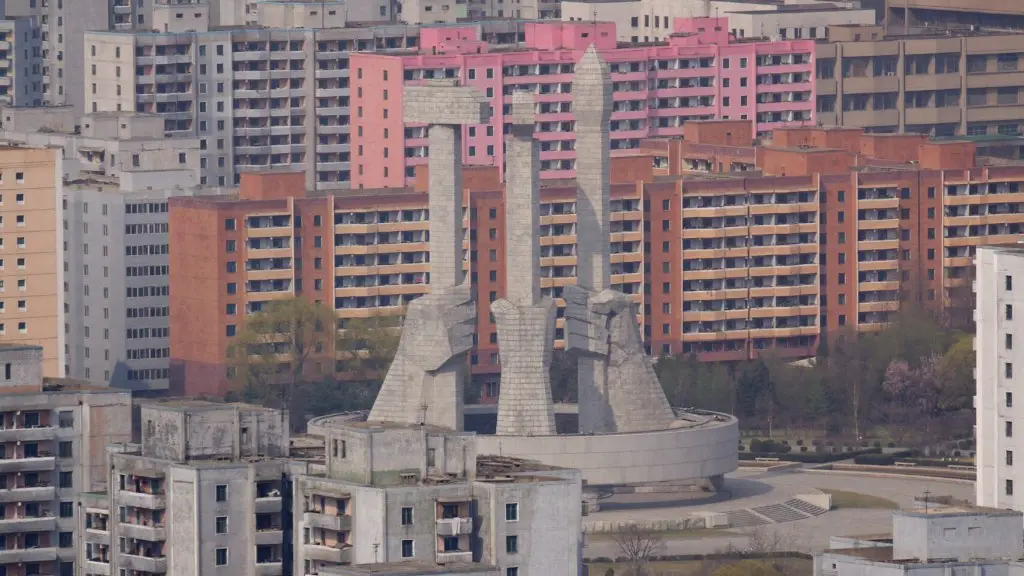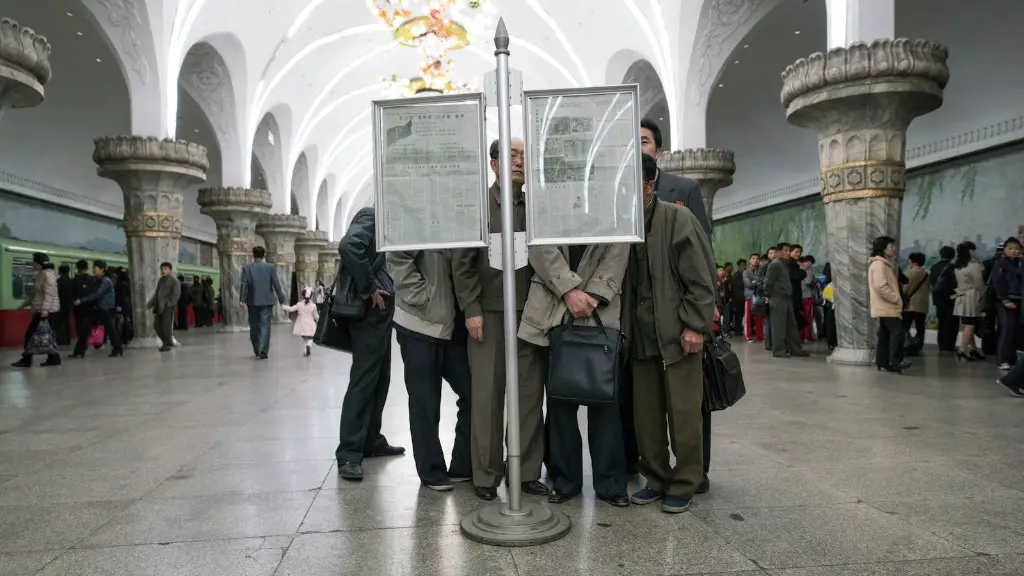Nuclear Technology in North Korea
North Korea’s history with nuclear technology dates back to the early 1950s, when Kim Il Sung offered to give the Soviet Union and China access to nuclear technology in exchange for their support in the Korean War. From then on, North Korea has been working to develop its own nuclear weapons and ballistic missiles. In 2003, North Korea declared itself a nuclear power by announcing its withdrawal from the Nuclear Non-Proliferation Treaty (NPT).
It is believed that North Korea was working to acquire nuclear weapons even before 2003. To this end, the nation had acquired discreetly technology, materials, and expertise from different sources, including Pakistan and Libya. In addition, North Korea has devoted substantial resources to building up its nuclear infrastructure and is believed to have significant stockpiles of fissile material at its disposal.
North Korea’s nuclear capabilities have become the subject of intense international scrutiny. In 2006, North Korea conducted its first nuclear test and followed this up in 2009 and 2013 with two more underground tests. The 2013 test is believed to have had a powerful yield of between 6 and 7 kilotons – enough to devastate central Seoul if launched from artillery in North Korea. In 2017, North Korean leader Kim Jong Un announced that North Korea had developed the capability to launch a nuclear-armed intercontinental ballistic missile (ICBM), a development that shocked the international community.
Reactions to North Korea’s Nuclear Program
The international community has responded with both concern and condemnation to North Korea’s nuclear ambitions. Prompted by the UN Security Council, various nations have imposed a range of economic and diplomatic sanctions on North Korea in an attempt to bring an end to its nuclear program. In spite of this, however, North Korea has remained intransigent and has resisted all attempts to denuclearize the Korean peninsula.
In response to growing tensions in the region, the United States and its allies have taken steps to ensure that North Korea is deterred from using its nuclear weapons. In addition to imposing economic sanctions, the US has deployed an increased military presence in South Korea, as well as deploying a Terminal High Altitude Area Defence (THAAD) anti-missile system. It has also sought to increase international pressure on North Korea through the UN Security Council, which has imposed a range of sanctions on North Korea in an attempt to prevent the further proliferation of nuclear weapons.
Efforts To Achieve Denuclearization
In spite of the growing tensions between the US and North Korea, there have been a number of efforts to achieve a peaceful resolution between the two nations. In 2018, Donald Trump was the first sitting US President to meet with the leader of North Korea, Kim Jong Un. Since then, both sides have indicated their commitment to working towards the denuclearization of the Korean peninsula, and there have been several working-level talks between the US and North Korea in an attempt to reach a lasting agreement.
In addition to the on-going diplomatic process, there have been several regional initiatives aimed at reducing tensions. South Korea has sought to play a key role in this process, proposing several ambitious projects aimed at advancing inter-Korean relations. These projects have included a ‘peace train’ from the South to Pyongyang, and the reopening of the inter-Korean Kaesong industrial complex.
Prospects for Denuclearization
Despite the ongoing efforts to bring about denuclearization on the Korean peninsula, the prospects for a successful outcome remain uncertain. North Korea is unlikely to part ways with its nuclear arsenal until it is able to trust that it will be secure without it. This, in turn, requires the US and its allies to provide concrete security guarantees that North Korea would not face a hostile attack or regime change.
At the same time, there is increasing scepticism among the US and its allies that North Korea is capable or even willing to keep any agreement it strikes with the US. The failure of the high-level talks between the US and North Korea in 2019 has further strained relations and raised doubts as to whether the two sides can overcome their differences and achieve a lasting agreement.
Impact of Nuclearization on North Korea
The development of nuclear weapons has had a significant impact on North Korea and its relations with the international community. On the one hand, North Korea has sought to use its nuclear program to deter potential aggression and to guarantee its security. On the other hand, the development of nuclear weapons has exacerbated tensions in the region and has led to increased international sanctions on the country.
Furthermore, North Korea’s nuclear program has had a negative impact on its economy, with the country largely cut off from the international community. This has caused food shortages and economic hardship, which has further deepened Pyongyang’s reliance on nuclear weapons.
The impact of the nuclear program on the population has also been significant. North Korea is estimated to have spent between 8% and 25% of its GDP on developing and maintaining its nuclear and missile programs. This has left the population bearing the brunt of these costs, with estimates suggesting that North Koreans are currently facing a lack of basic goods such as food, fuel and medical supplies.
International Responsibilities
The development of a North Korean nuclear arsenal has raised questions regarding the international community’s responsibility in addressing the issue. This has been complicated by the fact that North Korea’s nuclear program has been underpinned by its alliance with China, who are thought to have provided key technical support to the program.
At the same time, Russia has also been accused of providing support to the North Korean regime, with reports suggesting that Moscow has supplied crucial technology and resources to enable Pyongyang’s nuclear program. In light of this, international responsibility for the development of the North Korean nuclear arsenal can be said to fall at least partially upon China and Russia.
Implications of Nuclearization
The emergence of North Korea as a nuclear power has had dire implications for regional security. North Korea’s nuclear weapons capabilities have left the region at risk of a full-scale nuclear conflict, a risk that has been heightened by the North Korean government’s repeated threats to launch its missiles at South Korea, Japan, and the US.
Furthermore, the development of North Korea’s nuclear capability has had a destabilizing effect on the region and has led to a significant uptick in military tension in the Korean peninsula. This has been reflected in the deployment of the US’s Terminal High Altitude Area Defence (THAAD) anti-missile system in South Korea, as well as the increased presence of military forces from both North Korean and South Korean.
Role of the United Nations
In light of the serious security concerns posed by North Korea’s nuclear arsenal, the United Nations has sought to take a leading role in mediating between the US and North Korea. To this end, the UN Security Council has passed resolutions condemning North Korea’s nuclear program and has imposed a range of sanctions on the country in an attempt to put pressure on Pyongyang.
In addition, the UN has also invited North Korea to participate in various meetings to discuss the denuclearization of the Korean peninsula. While these meetings have so far failed to produce any concrete results, they have nonetheless allowed the international community to keep the door open for a potential diplomatic resolution to the ongoing conflict.
Conclusion
North Korea’s emergence as a nuclear power is one of the most pressing security concerns in the region. The North Korean government has consistently refused to take meaningful steps towards denuclearization and its intransigence has left the international community with few options other than to impose economic and diplomatic sanctions. In order to successfully achieve denuclearization on the Korean peninsula, international dialogue and cooperation are needed. The role of the UN in this process is pivotal, and it is hoped that the various initiatives that have been taken by countries in the region will eventually lead to a negotiated solution and bring an end to the nuclear crisis.


